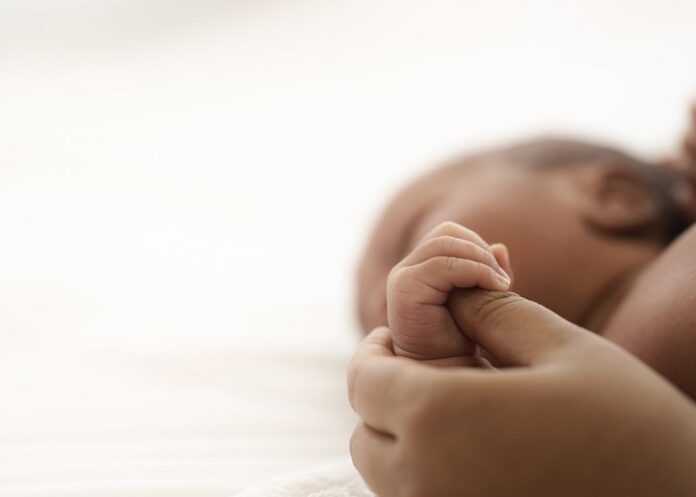Neither Covid-19 infection nor vaccination during the first trimester of pregnancy is associated with increased risk of major birth defects, found a study of nearly 345 000 babies by Scandinavian scientists.
While it’s well known that women who experience Covid-19 infection during pregnancy are at increased risk of severe illness and have a higher risk of complications, including preterm birth and stillbirth, less clear is the risk of birth defects after infection with or vaccination against the virus, as it has only recently become possible to study this research question.
To explore this, researchers used national health registries to identify 343 066 liveborn single infants in Sweden, Denmark and Norway with an estimated start of pregnancy between 1 March 2020 and 14 February 2022 and a minimum of nine months of postnatal follow-up time.
Information on laboratory-confirmed polymerase chain reaction (PCR) positive Covid-19 tests and vaccination was obtained from national health records and vaccination registries.
Major congenital anomalies were grouped according to EUROCAT definitions and included defects of the heart, nervous and respiratory systems, eye, ear, face and neck anomalies, oro-facial clefts, genital and limb anomalies.
News-Medical.net reports that potentially influential factors like the mother’s age, education, country of birth, weight (BMI), existing chronic conditions, and smoking during pregnancy, were also accounted for.
Of the 343 066 infants included in the infection analysis, 10 229 (3%) were exposed to Covid-19 infection during the first trimester and of 152 261 infants in the vaccination analysis, 29 135 (19%) were exposed to Covid vaccination during the first trimester.
A total of 17 704 (5.2%) of infants were diagnosed with a major congenital anomaly, but the researchers found no increased risk of any major congenital anomaly after infection with or vaccination against Covid-19 during the first trimester.
Overall, no notable increased risk among offspring of women vaccinated against Covid during the first trimester was found for 10 of the 11 groups of anomalies evaluated.
This is an observational study so no firm conclusions can be drawn about cause and effect, and although the researchers adjusted for a range of factors, they can’t rule out the possibility that other unmeasured factors, such as underlying genetic risk and pre-existing conditions in the women, may have influenced their results.
Nevertheless, this was a large study that used high-quality data from several countries, and results were similar after further analyses providing greater confidence in their conclusions.
As such, they say that neither Covid-19 infection or vaccination during the first trimester of pregnancy was associated with congenital anomalies. There also appeared to be no notable variation in the risk according to viral variants, although larger studies are needed to provide more robust evidence.
The paper was published by The BMJ.
Study details
Covid-19 infection and vaccination during first trimester and risk of congenital anomalies: Nordic registry based study
Maria Magnus, Jonas Söderling, Siri Håberg et al.
Published in The BMJ on 17 July 2024
Abstract
Objectives
To evaluate the risk of major congenital anomalies according to infection with or vaccination against Covid-19 during the first trimester of pregnancy.
Design
Prospective Nordic registry based study.
Setting
Sweden, Denmark, and Norway.
Participants
343 066 liveborn singleton infants in Sweden, Denmark, and Norway, with an estimated start of pregnancy between 1 March 2020 and 14 February 2022, identified using national health registries.
Main outcome measure
Major congenital anomalies were categorised using EUROCAT (European Surveillance of Congenital Anomalies) definitions. The risk after Covid-19 infection or vaccination during the first trimester was assessed by logistic regression, adjusting for maternal age, parity, education, income, country of origin, smoking, body mass index, chronic conditions, and estimated date of start of pregnancy.
Results
A total of 17 704 (5.2%) infants had a major congenital anomaly. When evaluating risk associated with Xovid-19 infection during the first trimester, the adjusted odds ratio ranged from 0.84 (95% confidence interval 0.51 to 1.40) for eye anomalies to 1.12 (0.68 to 1.84) for oro-facial clefts. Similarly, the risk associated with covid-19 vaccination during the first trimester ranged from 0.84 (0.31 to 2.31) for nervous system anomalies to 1.69 (0.76 to 3.78) for abdominal wall defects. Estimates for 10 of 11 subgroups of anomalies were less than 1.04, indicating no notable increased risk.
Conclusions
Covid-19 infection and vaccination during the first trimester of pregnancy were not associated with risk of congenital anomalies.
See more from MedicalBrief archives:
Milestone delays in babies exposed to Covid in womb – US cohort study
COVID doubles perinatal risk in pregnancy – Large Kaiser study

